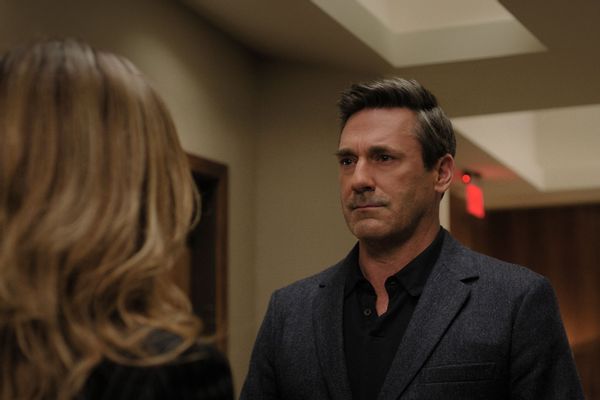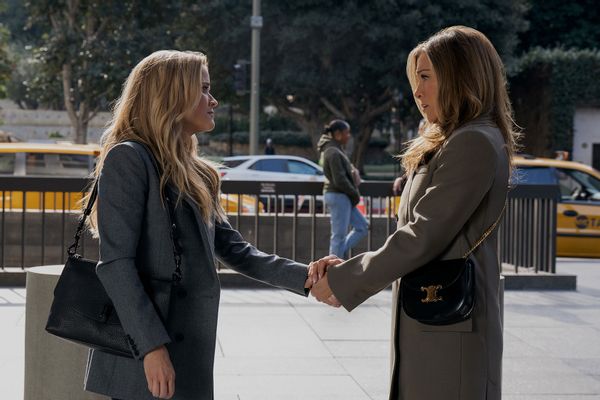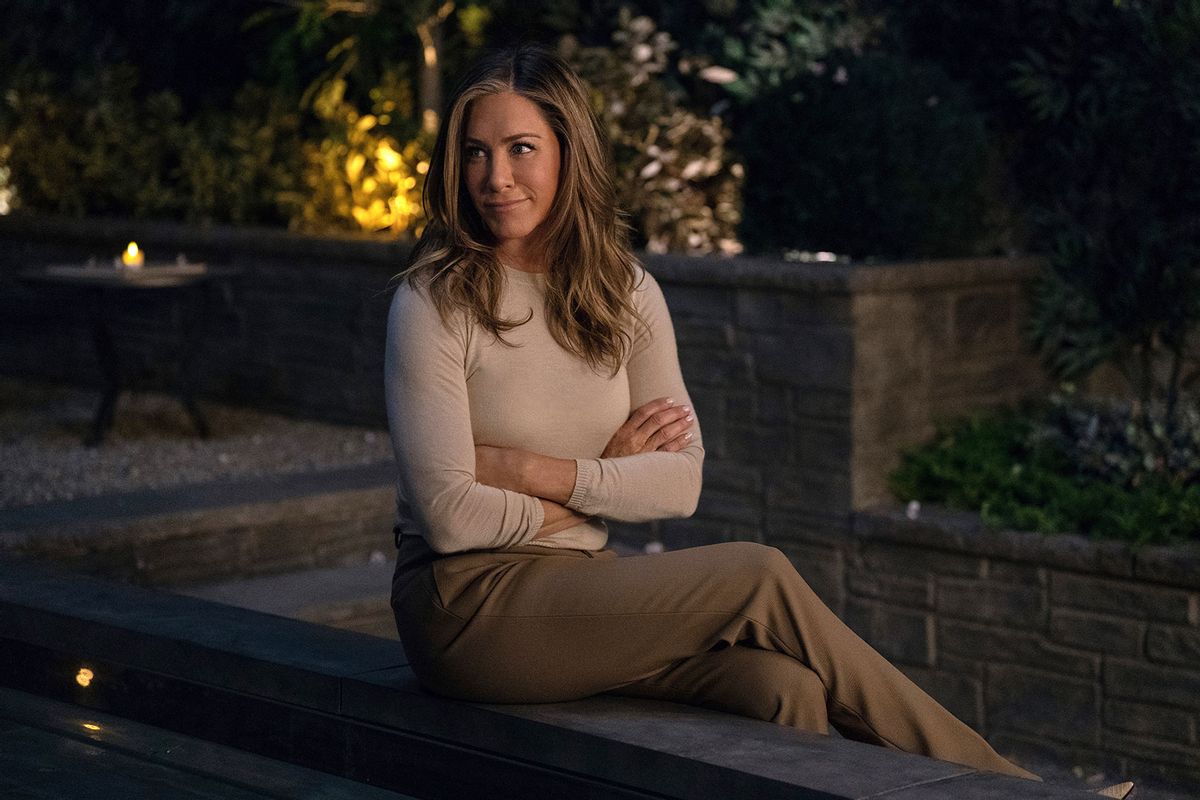If this season of "The Morning Show" made the UBA network look like an ecologically devastating forest fire, that means Charlotte Stoudt did the job she was brought in to do as its new showrunner. Stoudt, a veteran of "House of Cards" and "Homeland," is accustomed to burning story in service of one overarching, provocative theme. With the third season of "The Morning Show," Stoudt transforms the network news drama originally inspired by #MeToo and the pandemic in its opening seasons into a broader canvas to make a statement "about women's agency and autonomy, and all the things that challenge that," she explained to Salon.
Those challenges culminate in a season finale that hints at the potential reset for UBA — and the show itself. At the end of a season spent wooing the legacy media network's board and courting Greta Lee’s news president Stella Bak to take over for constantly embattled CEO Cory Ellison (Billy Crudup), Jon Hamm's billionaire Paul Marks is perched on the edge of acquiring the network. But Paul can only win dirty.
In that respect, he has plenty in common with all the company's top players. Just when Cory thinks he can outmaneuver Paul, the Hyperion founder leaks dubious photos of Cory with Bradley at the hotel where they both resided in past seasons. Alex Levy (Jennifer Aniston) aligns herself with Paul professionally and romantically, envisioning an opportunity to run a new media venture instead of waiting for a seat at UBA's table that Cory will never give her. Bradley Jackson's (Reese Witherspoon) supersonic rise to evening news anchor is undone by secrets Cory helped keep, including incriminating footage showing her brother Hal (Joe Tippett) beating up a Capitol Hill cop during the Jan. 6 insurrection attempt. With her relationships in a shambles, she shocks everyone by quitting at the top of the evening news broadcast.
Paul, being a tech genius, surfaces all their dirt to secure power. To silence Bradley's investigative report exposing secrets concerning fatal flaws in his space travel program, he surveils her — along with Alex, who fell under his spell long enough to drop her guard. Paul isn't the cause of all of UBA's problems, but from the moment his courtship with the company began he threw the place off-kilter by initiating the hack that exposed everyone's filthy laundry.
But he doesn't fully account for Alex's stubborn loyalty to UBA, Bradley and her sense of self-preservation. At the board meeting, Alex pulls a coup, proposing a "merger of equals" with a fellow legacy network that's also struggling — and follows that with a coup de grace, bringing Paul face-to-face with a Hyperion employee and one of Stella's old friends, Kate (Natalie Morales), who is ready to turn whistleblower.
With Bradley out of the network, and on her way to talk to the FBI, and Alex's future looking bright but uncertain, where does "The Morning Show" go from here? We recently asked Stoudt about that as well as walking with her through the season's most significant developments, in a wide-ranging chat conducted over Zoom.
This interview transcript has been edited for length and clarity.
You tackled a lot of current event topics this season: there's the pandemic flashback, Roe v. Wade, and through Christina we see systemic racism reflected through the UBA newsroom. There’s Bradley's connection to Jan. 6, and then on top of all that, Paul Marks. Explain to me how you wrestled all of this into shape. And at the end of the day, what did you see as the joining point for all of these forces?
I went off the DNA of the show, honestly. . . . It's an incredible show because to me, it's like a box that will hold anything if you just take the right way in. So all of these questions of systemic racism, minority rule —which could be the outsized power of billionaires, or the Supreme Court overturning Roe — they're all related to the question of women's power in the world and especially control over their bodies.
You know, you can be in Texas, and there's a straight white guy sending a rocket up. Meanwhile, there are women in a certain area of Texas who are simply going to be unable to make choices about their reproductive health care. Those things have to stand in tension with each other. So the thing that pulls everything together is the same thing that Seasons 1 and 2 are about which is really, what is women's power? How do they give it away? How are they complicit with patriarchy? Is there any way to actually change patriarchy or just punch a hole in it? Like, is it even possible? That's how everything seems like a big disparate season, but it really is all addressing the same question.
Let’s talk about Paul. What did you want to capture in his character?
I think there were a few things. Emotionally, the most important thing for me was I wanted Alex to fall in love. This woman has gone through a near-death experience at the end of Season 2. She's kind of reclaimed herself as a journalist as we see very briefly in Episode 305, in the flashback.
I'm always reminded of when Elizabeth Taylor got very sick in “Cleopatra” and almost died — she actually did die on an operating table, I think — she woke up and said, “I am going for what I want. I am never going to censor or question myself again.” And that eventually ended up being, you know, Richard Burton and taking on braver roles. So I really say this is like an inspiration for me with Alex, that she was going to make some choices that she would have never made before.
And I think finally meeting someone who isn't afraid of her power, and her strength . . . she was ready to meet someone like that. Because everyone on some level is always trying to manage Alex. And what there's someone out there who is like, “Be as big as you are, I'm good with that.”
"The absolute core of the show is Alex and Bradley and that love story, and how they keep trying to keep each other honest and call each other out."
But I also wanted to talk about just the outsize influence of billionaires and the whole sense of minority rule, and how one person can have such an extreme influence over so many other people when they were not elected to any kind of office. And I was very much thinking of, you know, Elon Musk being in between the States and Russia, and Ukraine with his satellites. Like, he wakes up one day and says, “You know what? I'm not giving you these free satellites anymore.” And that's a crazy idea that could shape geopolitics. So I'm kind of fascinated by these people who are just able to do that like they have a magic wand.
 Jon Hamm on "The Morning Show" (Apple TV+)You're talking about character motivations which, on that level, I see it. I'll also admit, that there's something that annoyed me about Alex and Paul's relationship as a journalist, which is that whenever journalists see a fictional journalist on TV sleeping with a source or sleeping with their boss, it just kind of makes our heads explode.
Jon Hamm on "The Morning Show" (Apple TV+)You're talking about character motivations which, on that level, I see it. I'll also admit, that there's something that annoyed me about Alex and Paul's relationship as a journalist, which is that whenever journalists see a fictional journalist on TV sleeping with a source or sleeping with their boss, it just kind of makes our heads explode.
But there's also the whole idea of, as you say, flirtation with power that Alex has with Paul. We're so used to, with billionaires, this split between the public trusting them and not trusting them that almost immediately, I thought “Oh, this will be a one-season relationship. So how would you weigh those issues when you have a relationship between these characters where one of them is bound by a certain code of professional ethics and the other comes from a specific ground of people who are known for unethical practices?
I think Alex knows he's not a Boy Scout. And she's not a Girl Scout. You know, she's done a lot of things so I think she initially thought, “This person has a couple of dents, but I can work with that.” And it's interesting what you say about the journalist’s code, and I very much respect that.
But say Paul hadn't surveilled Bradley and Alex did do go off with him and start a business. Maybe it would have been just fine. But she sort of went into it understanding that “I'm crossing the line. And I know it's going to be problematic, but this is what I want right now.” But I think the show tries to say that's her choice.
Bradley's situation represents what you're talking about in terms of women and agency because this is a person who sees an opportunity to catapult into one of the biggest positions in all of news, and happens to be covering up something really terrible. And then in the end, you don't often see a comeuppance like hers — that of someone who's deciding to take control of the situation.
Yeah. I was very certain that the truthteller should stumble this year and should step over a line in some way. And because she is the most divided character on the show— she does seem to mirror the country's divides, certainly the height of that divide — putting her at the center of Jan. 6 was just sitting there. So we went for it.
But I think the other kind of deeper thing for her, as you know, she's carrying this burden of having turned in her father, and Hal is always reminding her that blew up the family. So I think she's sort of breaking the family cycle to go to the FBI and take responsibility. Apart from the politics, it's really just a person trying to reconcile those broken parts of themselves in some way.
We need your help to stay independent
It's interesting to have this take place in a network newsroom, because I think, and this is going back to the #MeToo angle, one aspect of that is as soon as there's some sort of wrongdoing that doesn't come with criminal charges with any famous person, there is a tendency – more often with men, I should point out – for the public to ask, “OK, how soon can they come back?”
Was placing the enormity of this burden on Bradley intentional, just in terms of knowing that you're getting into a fourth season? Because, you know, Alex’s is kind of a moral slip whereas the other could come with charges.
"How do different women seek power? What are the kinds of bargains that different women make? And I think we need to answer that question."
Exactly. I mean, we were thinking about Jan. 6 long before the renewal. You know, the “Homeland” credo was always, “Tell the best story, burn it down, and then figure out what you did afterward. And how do you come back from it?” That's kind of how I thought about it, honestly. And yes, it presents some challenges, but also, what's there to explore and is there a way back and there's an external complication, but that's also how she feels about herself for having committed that sin in the first place. What was that addiction that led her to cross the line, and can she do good work without getting addicted again to the prestige and that platform of the evening news?
 Reese Witherspoon and Jennifer Aniston on "The Morning Show" (Apple TV+)The finale sets up this idea of a merger, presented by someone who wants a seat at the table, and who has the best idea in the room to essentially give a better option than selling out to someone who's going to strip the company for parts.
Reese Witherspoon and Jennifer Aniston on "The Morning Show" (Apple TV+)The finale sets up this idea of a merger, presented by someone who wants a seat at the table, and who has the best idea in the room to essentially give a better option than selling out to someone who's going to strip the company for parts.
Those are decisions that much of the news industry is facing, and while this is not really a cliffhanger, it ends the season by placing you in a direction for the next. What inspired that, I wouldn't call it a twist, but a turn at least for Alex and for UBA?
Well, maybe it's the thought of, can community save us? Can collaboration save us? And what if we didn't play capitalism's zero-sum game? What if we tried to do it a different way, a more collaborative way? Obviously, that's easier said than done. It's going to be painful, as most mergers are. And will everyone survive, as Mia asks? They're not going to be two morning shows or two evening anchors. Like, what happens? You're playing a different game of musical chairs, but can you actually make things a little better? Isn't it worth trying? Which is I think, kind of a thing we all have to ask ourselves at work — can we make it a little better?
Taking a community angle and a collaboration angle when it comes to a major corporate merger is a very optimistic way of looking at this.
I know, and I think Alex has been around the block. She knows how complicated it is. But she also knows that maybe the right way to play this is to just take Paul off the chessboard, and at least stall for time to keep the place from going under. But you're right. I mean, no one is naive about how difficult the path forward is. But at least maybe it's a path. It's better than nothing. And that may be where we are in the world right now.
Want a daily wrap-up of all the news and commentary Salon has to offer? Subscribe to our morning newsletter, Crash Course.
This is a story that's centered and begins with Bradley and Alex, but it has grown, especially this season, to bring forward other characters: Stella, Mia (played by Karen Pittman), Chris (Nicole Beharie), and Cory certainly. And I'm wondering if you visualize more expansion in those characters’ directions as the show goes forward. Or is it by necessity still going to remain anchored around Alex and Bradley?
Yeah, I mean, I think the absolute core of the show is Alex and Bradley and that love story, and how they keep trying to keep each other honest and call each other out. And I think that's always going to be there. But I think the great thing about the show is, there is room to expand these other stories. And I think we crave them. I mean, one, these actors are just so tremendous, and all these stories, comment on the other ones, you know, what I mean? Just the sense of, how do different women seek power? What are the kinds of bargains that different women make? And I think we need to answer that question. We need to see a lot of different women. It's as simple as that. Is it possible to sort of live according to my beliefs but still play on the sort of biggest chess board? I think that's a question most professional women ask themselves. And all those questions are answered so differently.
Until now, “The Morning Show” mainly tackled domestic issues, just in terms of what's going on in American society. The pandemic was global, but the show handled it from a perspective of what it was like to be in New York at that time. Right now, of course, we have major international issues transpiring with two wars that Americans are watching from afar. And I'm wondering if that might hit home next season, or are you thinking that, given the focus on women and the issues we’re facing, you may want to keep the news stories that “The Morning Show” handles on the domestic front?
I think you've been listening in on the writers' room. I think there might be an attraction just some international stories there, yeah.
All episodes of "The Morning Show" are streaming on Apple TV+.



Shares